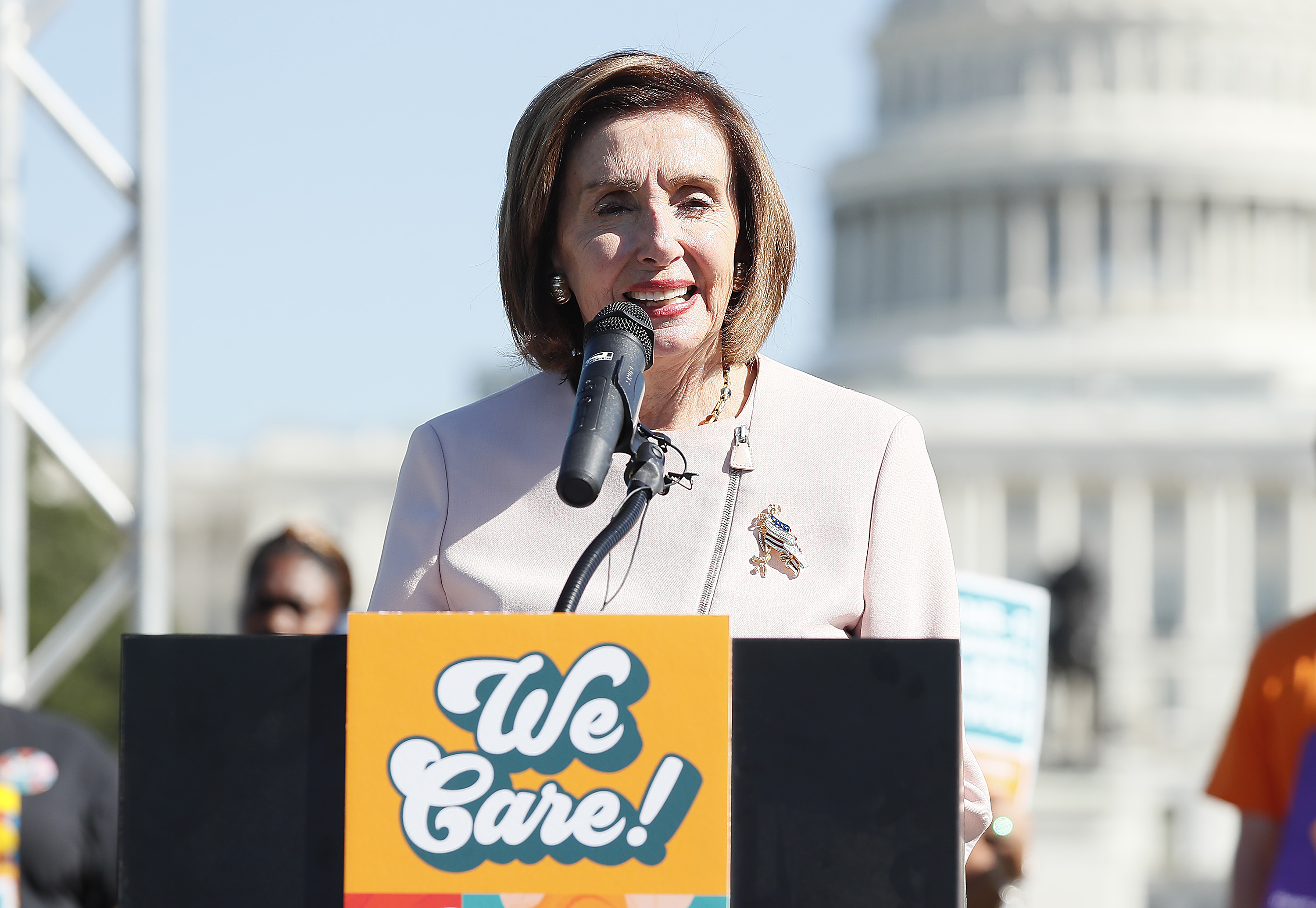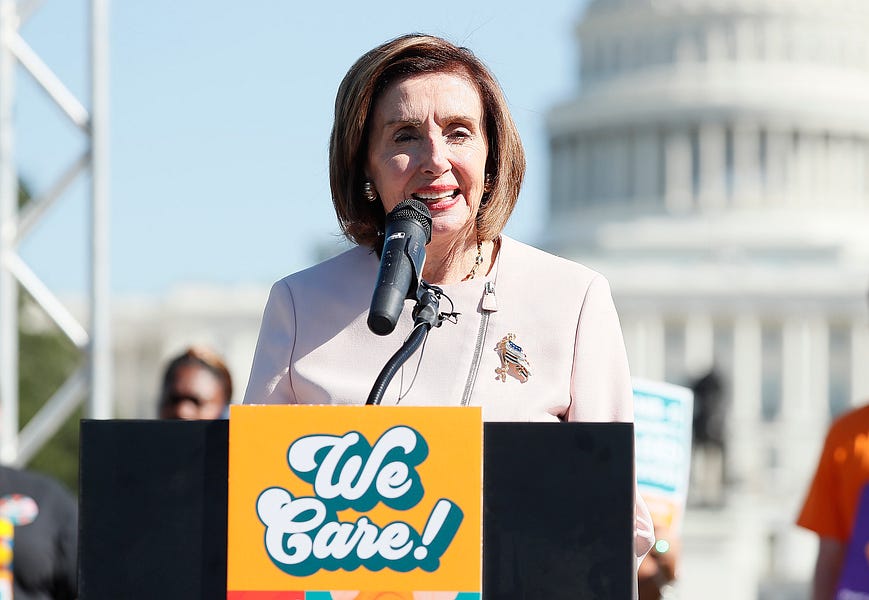Happy Monday! We at The Dispatch tend to favor pumping the brakes on the populist passions of the mob, but we do not begrudge the crowds chanting “Fire Nagy” throughout Chicago yesterday one bit.
Quick Hits: Today’s Top Stories
-
All adults over the age of 18 are now eligible to receive Pfizer-BioNTech or Moderna COVID-19 booster shots six months after their second dose. The Food and Drug Administration amended the two vaccines’ emergency use authorizations on Friday, and the Centers for Disease Control formally recommended the booster shots shortly thereafter.
-
President Joe Biden—who turned 79 over the weekend—underwent a physical exam on Friday, with his primary care physician deeming him “fit to successfully execute the duties of the Presidency.” Biden’s doctor said the president is currently being treated for atrial fibrillation, hyperlipidemia, gastroesophageal reflux, seasonal allergies, and a stiffened gait.
-
Abdalla Hamdok—the Sudanese prime minister ousted in last month’s coup—was reinstated atop the country’s civilian government after reaching an agreement with military leader Gen. Abdel Fattah al-Burhan over the weekend. Hamdok said he signed the agreement to bring an end to the protests and violence that have resulted in dozens of deaths in recent weeks, but protesters—who view any deal with the military as a betrayal—remained in the street on Sunday.
-
At least five people were killed and more than 40 injured when a man drove an S.U.V. through a Christmas parade in Waukesha, Wisconsin on Sunday night. Police said the driver is in custody.
-
In an effort to quell international concerns over Peng Shuai’s disappearance, Chinese state-run media released two videos of the tennis player over the weekend—one of her eating dinner, and one at a youth tennis tournament. International Olympic Committee president Thomas Bach said he held a 30-minute video call with Peng on Sunday in which she told him she is “safe and well” at her home in Beijing, but Women’s Tennis Association CEO Steve Simon is not satisfied. “While it is positive to see her, it remains unclear if she is free and able to make decisions and take actions on her own, without coercion or external interference,” he said. “This video alone is insufficient.” The story remains heavily censored in China.
House Democrats Blow Past Congressional Budget Office Score

To satisfy the competing—and often contradictory—political motivations of the House Democratic Caucus, Speaker Nancy Pelosi had long wanted to pass the bipartisan infrastructure framework (BIF) and Build Back Better Act (BBB) in quick succession. Five Democratic moderates didn’t let her.
“We had hoped to be able to bring both bills to the Floor today,” Pelosi said on November 5, just hours before the House sent BIF to the White House for President Biden’s signature. “Some members want more clarification or validation of numbers that have been put forth—its topline, that [BBB] is fully paid for. And we honor that request.”
President Biden had been promising for months that BBB wouldn’t add anything to the federal deficit, but the five Democratic moderates—Reps. Josh Gottheimer, Jared Golden, Ed Case, Stephanie Murphy, and Kurt Schrader—wanted to hear it from a more impartial source.
“In order to ensure the final bill is indeed fiscally responsible, we must first have the proper CBO/JCT scoring information before any floor consideration,” they wrote to Pelosi in early November, referencing the nonpartisan Congressional Budget Office (CBO) and Joint Committee on Taxation (JCT). “Therefore, we cannot lend our support to advancing the BBB Act until we have had a chance to review these scores which provide the true cost of the legislation.”
As we noted last week, BBB is designed with several expiration dates and sunset clauses intended to—artificially, Republicans would argue—keep the topline cost of the legislation down. “If the plan’s temporary policies were made permanent, we find the cost would increase by as much as $2.5 trillion,” the nonpartisan Committee for a Responsible Budget wrote last week. “The gross cost of the bill would more than double from $2.4 trillion to $4.9 trillion.”
“[Democrats] are designing the bill in a certain way in which the Congressional Budget Office won’t count $2 trillion of the spending,” Manhattan Institute fellow Brian Riedl told The Dispatch. “That doesn’t mean it’s not going to happen.”
But Gottheimer et al.—whose votes Democrats needed—hitched their wagons to the CBO’s score, setting up a high-stakes waiting game in Washington as analysts at the agency crunched the numbers. Would the nonpartisan body—which Biden praised as the “gold standard” for economic analysis when he was vice president—fortify Democrats’ claims of deficit neutrality and smooth BBB’s passage? Or would it undermine them and imperil the social spending package?
About midway through last week, it became clear that Democrats were bracing for the latter. “In this one case, I think we’ve made a very strong empirical case for CBO not having an accurate score,” Assistant Treasury Secretary Ben Harris told the New York Times, preemptively claiming the CBO would likely be too conservative in its estimates of how much extra money a beefed up Internal Revenue Service (IRS) would rake in. Deputy White House press secretary Andrew Bates concurred, citing an op-ed from former Treasury Secretary Larry Summers—who has been critical of the Biden administration in the past—and telling reporters the CBO “does not have experience analyzing revenue amounts gained from cracking down on wealthy tax cheats.”
On Thursday night, the CBO confirmed that the Biden administration’s concerns about its score were well-placed, concluding that BBB would add roughly $160 billion to the deficit over the next decade. The legislation’s additional $80 billion in IRS funding, the nonpartisan body said, would only generate $207 billion in revenue over the same time period. “Research about the deterrent effects of [tax] enforcement has found varying responses, depending on the type of taxpayer,” CBO Director Phillip Swagel wrote. “People generally increase their reported income in the years following an audit, but people with higher income generally do not, and neither do corporations.”
Within minutes, Treasury Secretary Janet Yellen released a statement of her own contradicting the CBO and claiming not only that BBB was fully paid for, but that it would actually reduce the national debt. “A particularly salient aspect of the revenue raised by the legislation is a historic investment in the IRS to crack down on high-earners who avoid paying the taxes that they owe, which Treasury estimates would generate at least $400 billion in additional revenue,” she said, presenting a far rosier assessment than the CBO’s $207 billion. “I urge them to pass it.”
After Minority Leader Kevin McCarthy delayed the proceedings until Friday morning with a nearly nine-hour monologue, they did just that. Yellen’s statement provided enough political cover for four of the aforementioned five Democrats to drop their opposition to the legislation, and the House voted 220-213 to advance it. Rep. Golden of Maine was the only Democrat to oppose the bill.
BBB—the substance of which our Uphill team has been breaking down in painstaking detail—now faces an uncertain future in the evenly divided Senate, where moderate Democratic Sens. Joe Manchin and Kyrsten Sinema hold all the leverage. “Everyone knows that Manchin and Sinema have their concerns,” Senate Majority Leader Chuck Schumer admitted yesterday. “But we’re going to try to negotiate with them and get a very strong, bold bill out of the Senate which will then go back to the House and pass.”
Kyle Rittenhouse Acquitted on All Charges
The United States has produced its fair share of notorious criminal proceedings in recent years—Derek Chauvin, Bill Cosby, George Zimmerman—but few have taken on as high of culture war stakes as Kyle Rittenhouse’s murder trial. As the prosecution and defense duked it out in the (live streamed) Kenosha County Courthouse the past few weeks, millions of Americans were transported back to the summer of 2020, when a series of police killings and shootings sparked widespread protests that regularly gave way to violent riots.
Amidst the chaos of one of those riots—in Kenosha, Wisconsin on August 25, 2020—a then-17-year-old Rittenhouse shot three men, killing two of them. At issue in this month’s trial was whether those shootings constituted either first-degree homicide and reckless endangerment or the exertion of Rittenhouse’s self-defense rights. After more than 25 hours of deliberations spread over four days, the 12-person jury deemed them to be the latter, acquitting Rittenhouse on all five charges against him. (The judge had dismissed a sixth, misdemeanor weapons charge against Rittenhouse earlier in the week.)
Under Wisconsin state law, a person is entitled to use force “likely to cause death” if that person “reasonably believes that such force is necessary to prevent imminent death or great bodily harm to himself or herself.” Over the course of the trial—with video evidence and witness testimony—Rittenhouse’s defense team was able to convince the jury that these were the circumstances of his use of force. One witness testified the first man Rittenhouse shot—a 36-year-old man named Joseph Rosenbaum—threatened to kill the teen and reached for Rittenhouse’s rifle. The second, a 26-year-old named Anthony Huber, lunged at Rittenhouse with a skateboard while also trying to grab the teen’s gun. The third man Rittenhouse shot—27-year-old Gaige Grosskreutz—testified that he had drawn his own gun on Rittenhouse because he “thought the defendant was an active shooter.”
Whether Rittenhouse should have put himself in that situation in the first place is certainly a fair question, but it’s all but irrelevant, legally speaking. “When Kyle Rittenhouse walked the streets of Kenosha in the midst of urban unrest following the police shooting of Jacob Blake holding a rifle in the ‘patrol carry’ or ‘low ready’ position, similar to the positions used by soldiers walking in towns and villages in war zones, without any meaningful training, he was engaged in remarkably dangerous and provocative conduct,” The Dispatch’s David French wrote in a piece for The Atlantic. “But that dangerous and provocative conduct did not eliminate his right of self-defense, and that self-defense claim is the key issue of his trial, not the wisdom of his vigilante presence.”
Rittenhouse struggled to hold back tears as the verdicts were read aloud on Friday. “The jury reached the correct verdict,” he told a Fox Nation documentary crew that has been following the trial. “Self-defense is not illegal. And I believe they came to the correct verdict and I’m glad that everything went well.”
Not everyone agrees the correct verdict was reached. NAACP President Derrick Johnson argued it will serve as a “warning shot” that “vigilante justice” is acceptable, and the father of Jacob Blake—whose shooting at the hands of police left him paralyzed and sparked the Kenosha riots—told Axios he believed Rittenhouse’s acquittal was another reminder we live in a “society built on systemic racism.”
“There was no way they were going to convict that white individual with killing those other two white individuals that had the nerve to be out there supporting a black individual,” he said.
The story has taken on a racial dimension despite Rittenhouse and all three men he shot being white, in part due to the riots where the shootings occurred ostensibly being tied to Blake’s shooting, and in part due to shoddy journalism and irresponsible statements. Progressive Reps. Ayanna Pressley and Cori Bush have both labeled Rittenhouse a “white supremacist,” and, Rep. Sean Patrick Maloney, chairman of the Democratic Congressional Campaign Committee, at first erroneously claimed Blake was “an unarmed Black man” who was killed by police. And as late as Friday, The Independent declared Rittenhouse had shot three black men. Then-candidate Joe Biden used a photo of Rittenhouse in a campaign advertisement attempting to tie Donald Trump to white supremacists. (Rittenhouse, in a Fox News interview set to air tonight, says he supports “the BLM movement.”)
When Biden was first asked about the verdict Friday afternoon, he told reporters he stood by the jury’s conclusion. “The jury system works,” he said, “and we have to abide by it.” Shortly after, he issued a longer statement urging Americans to express their thoughts on the trial peacefully. “While the verdict in Kenosha will leave many Americans feeling angry and concerned, myself included, we must acknowledge that the jury has spoken,” he said. “Violence and destruction of property have no place in our democracy.”
As for what comes next for Rittenhouse, a spokesman for his family told WBBM the teen plans to “[move] on as an 18-year-old young man in college studying to be a nurse.” But it will be hard for him to shake the folk hero status he’s built up on the right over the past year. A Tucker Carlson-produced documentary about the teen is slated to debut next month, and multiple Republican members of Congress are publicly vying for Rittenhouse’s services in their offices. “I will arm wrestle @mattgaetz to get dibs for Kyle as an intern,” said Rep. Paul Gosar, who last week was censured by the House for tweeting a cartoon video depicting himself attacking Rep. Alexandria Ocasio-Cortez with a sword.
Mark Richards, a lawyer who represented Rittenhouse, criticized politicians for exploiting his client. “They’re raising money on it and you have all these Republican congressmen saying come work for me,” he said. “They want to trade on his celebrity and I think it’s disgusting.”
Worth Your Time
-
Pope Francis offered us journalists a roadmap last week. “Your mission is to explain the world, to make it less obscure, to make those who live in it less afraid of it and look at others with greater awareness, and also with more confidence,” he said. Conor Friedersdorf took the advice to heart. “We could all get out more and learn from conversations with people who are not like us,” he writes in his latest for The Atlantic. “If you’re making sweeping declarations about, say, GOP voters or progressive social-justice activists without having ever met or talked to any, you’re likely getting something wrong. Whether you’re reaching people through the media or social media, the consequences are fueling polarizing anxiety among some and losing the trust of others. Humans evolved to communicate in person. That is how many of us understand best and are best understood. So before drawing conclusions about any group of people, we should all strive to make sure we’ve talked with some of them face-to-face.”
Presented Without Comment
Toeing the Company Line
-
Over the weekend, Steve and Jonah announced their resignations from Fox News. “We started The Dispatch two years ago ‘to do right as we see it, by providing engaged citizens fact-based reporting and commentary on politics, policy and culture—informed by conservative principles,’” they write. “We made a promise to our readers and members that we’d challenge our own assumptions as we challenged theirs, and that we wouldn’t pull punches. The tension between doing that work well and remaining loyal to Fox has tested us many times over the past few years. But with the release of [Tucker Carlson’s] Patriot Purge, we felt we could no longer ‘do right as we see it’ and remain at Fox News. So we resigned.”
-
In Friday’s Vital Interests (🔒), Tom Joscelyn examines last week’s Biden-Xi meeting. “Free. Open. Fair. Those are the words President Biden chose to describe his vision of the ‘international system,’ which he sees as embroiled in a contest between democracies and autocracies,” Joscelyn writes. “Xi’s vision is radically different—even if he doesn’t explicitly say so.”
-
Jonah’s Friday G-File was written at a rest stop off I-70 in Somerset, Pennsylvania, and builds on Yuval Levin’s piece for The Dispatch on social discontent earlier in the week. “The internet (and automation generally) is incredibly good at cutting out middlemen,” Jonah writes. “Why go to the store in your car and pay for stuff when you can have it delivered to your house? Why go to the movies when you can “Netflix and chill”? Why deal with the social awkwardness—fueled by how we raise kids to be fragile—of dating when you can watch porn?” The answer, Jonah posits, is economic growth: “It creates avenues for real life satisfaction through a sense of accomplishment and pride that comes from honest work and improving the lives of those you care about.”
-
In Sunday’s French Press, David laments the moral collapse of Liberty University. “Tens of thousands of Americans have attended Liberty University and had wonderful experiences,” he writes. “There are thousands of students and alumni and hundreds of faculty members who not only do their best to live out the values of their faith, they’re grieved by the corruption in their institution. They don’t see enrollment numbers and donor dollars as proof of righteousness. They want change. They want repentance. And they understand that no matter the condition of the world around their university, its humility and obedience are imperative. The future is grave for the church in America if its salt loses its taste or its light goes out.”
Let Us Know
Where does the BBB go from here? Is Chuck Schumer right that Senate Democrats will produce a “strong, bold bill” that will pass the House?
Reporting by Declan Garvey (@declanpgarvey), Andrew Egger (@EggerDC), Charlotte Lawson (@lawsonreports), Audrey Fahlberg (@AudreyFahlberg), Ryan Brown (@RyanP_Brown), Harvest Prude (@HarvestPrude), and Steve Hayes (@stephenfhayes).






Please note that we at The Dispatch hold ourselves, our work, and our commenters to a higher standard than other places on the internet. We welcome comments that foster genuine debate or discussion—including comments critical of us or our work—but responses that include ad hominem attacks on fellow Dispatch members or are intended to stoke fear and anger may be moderated.
You are currently using a limited time guest pass and do not have access to commenting. Consider subscribing to join the conversation.
With your membership, you only have the ability to comment on The Morning Dispatch articles. Consider upgrading to join the conversation everywhere.